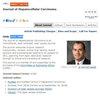The State of Systematic Therapies in Clinic for Hepatobiliary Cancers
IF 4.2
3区 医学
Q2 ONCOLOGY
引用次数: 0
Abstract
Abstract: Hepatobiliary cancer (HBC) includes hepatocellular carcinoma and biliary tract carcinoma (cholangiocarcinoma and gallbladder carcinoma), and its morbidity and mortality are significantly correlated with disease stage. Surgery is the cornerstone of curative therapy for early stage of HBC. However, a large proportion of patients with HBC are diagnosed with advanced stage and can only receive systemic treatment. According to the results of clinical trials, the first-line and second-line treatment programs are constantly updated with the improvement of therapeutic effectiveness. In order to improve the therapeutic effect, reduce the occurrence of drug resistance, and reduce the adverse reactions of patients, the treatment of HBC has gradually developed from single-agent therapy to combination. The traditional therapeutic philosophy proposed that patients with advanced HBC are only amenable to systematic therapies. With some encouraging clinical trial results, the treatment concept has been revolutionized, and patients with advanced HBC who receive novel systemic combination therapies with multi-modality treatment (including surgery, transplant, TACE, HAIC, RT) have significantly improved survival time. This review summarizes the treatment options and the latest clinical advances of HBC in each stage and discusses future direction, in order to inform the development of more effective treatments for HBC.Keywords: hepatobiliary cancer, systemic treatment, combination therapies
肝胆癌临床系统疗法的现状
摘要:肝胆管癌(HBC)包括肝细胞癌和胆道癌(胆管癌和胆囊癌),其发病率和死亡率与疾病分期密切相关。手术是治愈早期 HBC 的基石。然而,很大一部分 HBC 患者被诊断为晚期,只能接受全身治疗。根据临床试验结果,随着疗效的提高,一线和二线治疗方案也在不断更新。为了提高疗效,减少耐药性的发生,降低患者的不良反应,HBC 的治疗逐渐从单药治疗发展到联合治疗。传统的治疗理念认为,晚期 HBC 患者只能接受系统治疗。随着一些令人鼓舞的临床试验结果的出现,治疗理念发生了革命性的变化,晚期 HBC 患者在接受新型系统性联合疗法和多模式治疗(包括手术、移植、TACE、HAIC、RT)后,生存时间明显改善。本综述总结了 HBC 各阶段的治疗方案和最新临床进展,并探讨了未来的发展方向,以期为开发更有效的 HBC 治疗方法提供参考。
本文章由计算机程序翻译,如有差异,请以英文原文为准。
求助全文
约1分钟内获得全文
求助全文
文献相关原料
| 公司名称 | 产品信息 | 采购帮参考价格 |
|---|

 求助内容:
求助内容: 应助结果提醒方式:
应助结果提醒方式:


